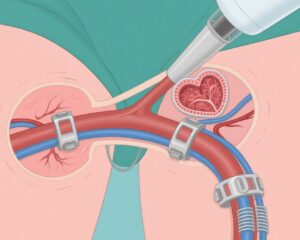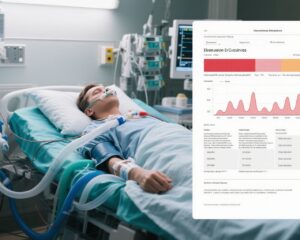Highlight
- The LASCAR-AHF randomized trial showed low-dose intravenous carperitide did not improve 2-year mortality or hospitalization rates in acute heart failure (AHF) patients.
- A nationwide cohort study from Japan revealed higher in-hospital mortality, longer hospital stays, and increased costs associated with carperitide compared to nitrates in early AHF treatment.
- No significant improvements in dyspnoea, urine output, or biomarkers were observed with carperitide, and kidney function declined more in treated patients.
- Routine use of carperitide as a first-line vasodilator for AHF is questionable, warranting further investigation and cautious clinical use.
Study Background and Disease Burden
Acute heart failure (AHF) remains a significant cause of hospital admission and mortality worldwide, posing substantial clinical and economic burdens. Vasodilators are commonly employed to reduce cardiac preload and afterload, alleviating symptoms and improving hemodynamics during acute decompensation. Carperitide, a recombinant human atrial natriuretic peptide, is used widely in Japan as a vasodilator despite limited and conflicting evidence regarding its efficacy and safety. While Nesiritide, a related agent, showed unfavorable outcomes in prior studies, carperitide’s clinical benefit and long-term impact on outcomes are not fully established, creating an unmet need for robust data guiding its use.
Study Design
Two complementary studies focused on carperitide’s role in AHF management were analyzed:
1. The LASCAR-AHF Trial: A multicenter, open-label, randomized controlled trial enrolled 247 patients with AHF from nine sites in Japan between November 2014 and March 2021. Patients were randomized to receive low-dose intravenous carperitide plus standard treatment or standard treatment alone for 72 hours. The primary endpoint was a composite of all-cause mortality and heart failure hospitalization within 2 years. Secondary outcomes included cumulative urine volume, dyspnoea severity, and biomarker changes at 72 hours.
2. Nationwide Claims-Based Cohort Study: An observational study utilized data from 76,924 hospitalized AHF patients across 808 Japanese hospitals between April 2012 and March 2014. Patients treated with either carperitide (n=33,386) or nitrates (n=12,209) within the first two days were compared. Outcomes assessed were in-hospital mortality, length of stay, and hospitalization costs, adjusted by inverse probability of treatment weighting to balance demographic and clinical variables.
Key Findings
1. The LASCAR-AHF Trial Results
– The primary endpoint occurred in 29.5% of patients receiving carperitide and 28.0% receiving standard care, yielding a hazard ratio (HR) of 1.26 (95% CI 0.78–2.06; P=0.827), indicating no significant difference.
– Secondary endpoints such as urine volume, dyspnoea scores, and biomarker changes (brain natriuretic peptide, cystatin C, renin, aldosterone, catecholamines) at 72 hours were comparable between groups.
– A significantly greater decrease in estimated glomerular filtration rate (eGFR) was observed in the carperitide group (inter-group difference: -3.9 mL/min/1.73 m2; 95% CI -7.0 to -0.8), suggesting potential renal impairment.
– The trial was underpowered due to premature enrollment termination, limiting definitive conclusions.
2. Nationwide Cohort Study Findings
– After statistical balancing, carperitide use was associated with a significantly higher in-hospital mortality risk vs. nitrates (HR 1.49; 95% CI 1.35–1.64).
– Patients receiving carperitide had longer hospital stays (coefficient 0.062; 95% CI 0.048–0.076) and increased hospitalization costs (coefficient 0.024; 95% CI 0.010–0.037).
Expert Commentary
The LASCAR-AHF trial provides important randomized evidence that low-dose carperitide may not improve long-term survival or reduce hospital re-admissions in AHF patients. However, its limited sample size and early termination underscore the need for caution in interpreting findings.
The nationwide database study complements these findings by highlighting worse short-term clinical outcomes and resource utilization associated with carperitide compared to nitrates, a widely accepted first-line vasodilator. These real-world data raise concerns regarding the safety and cost-effectiveness of carperitide when used routinely.
Mechanistically, carperitide’s natriuretic and vasodilatory effects theoretically benefit AHF by reducing ventricular preload and afterload and promoting diuresis. However, the observed decline in renal function in treated patients suggests possible adverse renal hemodynamics, which may offset clinical benefit.
International guidelines currently do not recommend carperitide due to insufficient evidence, aligning with observational data suggesting cautious use. More extensive, adequately powered randomized trials are warranted to define its role definitively. Clinicians should carefully weigh the potential benefits against risks, especially renal function deterioration, when considering carperitide.
Conclusion
Despite its widespread use in Japan, low-dose intravenous carperitide demonstrated no significant improvement in long-term mortality or heart failure hospitalizations in AHF patients when added to standard treatment. Furthermore, observational evidence indicates higher in-hospital mortality and healthcare resource use compared with nitrates during early hospitalization. These findings call into question routine carperitide use as a first-line vasodilator in AHF care. Future research should focus on clarifying patient subgroups that may benefit and elucidating the mechanistic impact on renal function to optimize therapeutic strategies in acute heart failure management.
References
1. Honda S, Nagai T, Honda Y, et al. Effect of low-dose administration of carperitide for acute heart failure: the LASCAR-AHF trial. Eur Heart J Acute Cardiovasc Care. 2025;14(2):83-92. doi:10.1093/ehjacc/zuae140.
2. Nagai T, Iwakami N, Nakai M, et al.; JROAD-DPC investigators. Effect of intravenous carperitide versus nitrates as first-line vasodilators on in-hospital outcomes in hospitalized patients with acute heart failure: Insight from a nationwide claim-based database. Int J Cardiol. 2019;280:104-109. doi:10.1016/j.ijcard.2019.01.049.




May I simply just say what a relief to find a person that really knows what they’re discussing online.
You actually realize how to bring a problem to light and make it important.
More and more people need to read this and understand this side of the story.
I can’t believe you aren’t more popular given that
you most certainly have the gift.